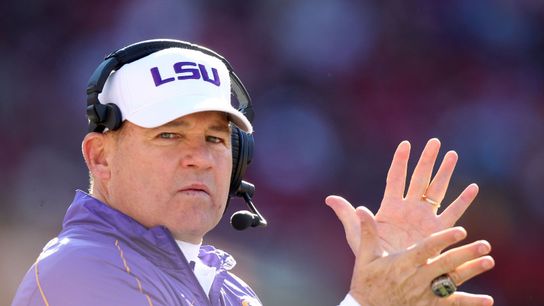LSU was docked 10 percent of its evaluation days - 21 out of 210 - by the SEC in what Les Miles believes is a penalty akin to a retroactive speeding ticket six months after a speed limit had been changed.
Last August, Mississippi offensive lineman Matt Womack signed a financial aid agreement with LSU, which lifted any sort of recruiting calendar restrictions between Womack and the Tigers. LSU could speak with and visit Womack whenever it pleased with no restrictions, essentially making Womack a Tiger six months ahead of time.
However, the FAA agreement came with a catch. The agreement was non-binding for Womack, and should he choose to enroll at another school, LSU could be subject for retroactive recruiting violations for contacting an unsigned prospect outside the approved times.
Womack signed with Alabama in February, and LSU was sanctioned by the SEC. In addition to losing three weeks' worth of evaluations, LSU can not sign another player to FAA papers for two years. LSU believes it is the first school hit with such sanctions. "I don't know how it could have been done any differently," Miles said last month. We signed a guy who committed to us to come to us. Then he decided, really in his home, that he was thinking about not taking the English course that was going to allow him to come early to LSU. At that point in time, we went back to our compliance officers and they said cease and desist on recruiting him any more. We couldn't even call, and/or recruit the guy."
Prospects are not permitted to sign FAA papers with multiple schools, but they can sign a National Letter of Intent with any school that puts the paper in front of them.
"He went to another school, which is punishment enough," Miles said. "I didn't quite know how to handle it any differently than we did. The parallel is that they put a speed limit sign up so you went that speed limit and then they took the speed limit sign down and put up a lesser one, then they give you a ticket for going by (the limit) before."
The Atlanta Journal-Constitution asked a number of Miles' peers about the rule, most of whom responded something to the effect of, "Better them than us."
“We did that two years ago with a number of players, and fortunately they all came to Tennessee," said Butch Jones. "We elected to not do that (for 2015 signees). We elected not to do that with anybody in this recruiting class because we did know the penalty. We elected as a program to not sign those individuals to financial-aid agreements because of the repercussions, and what would happen down the line if they didn’t attend your institution."
Added Oklahoma's Bob Stoops: “Yeah, that’s going to be a big deterrent. That’s a strong penalty. That’s a strong penalty in my eyes, so that will definitely make us very cautious in doing something like that – to go ahead and make multiple phone calls and contact with a player who has signed financial-aid agreements if you’re going to get that kind of penalty if they don’t end up coming with you.”
Said Arkansas' Bret Bielema: "We knew that there was going to be a stiff penalty from the SEC this year. We did it with four players that we knew had been committed to us for a long time. Their parents knew that if they backed out on us, it would not only affect the scholarship we had for their son, but it could also affect us (in other ways). It’s one of those ‘You better make them understand real quick about how it can adversely affect the University of Arkansas if they go against it.’”
